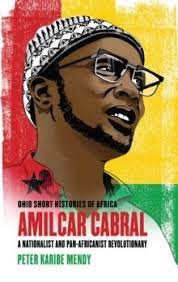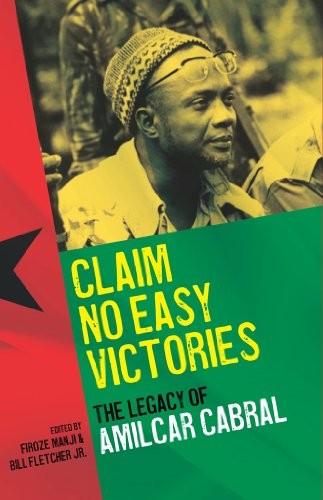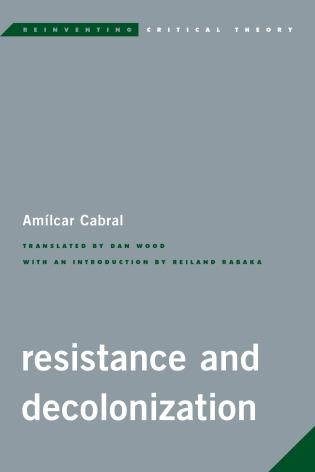Ohio University Press has a series of "Short Histories of Africa". I recently decided to pick up most of the collection for potential use as reading materials for classes. This post covers "Amilcar Cabral: Nationalist and Pan-Africanist Revolutionary" (2019), by Peter Karibe Mendy. This book in relatively longer in this series, like the Nkrumah book, contains a rich historical contextualization and offers a detailed account. Some notes:
"Desperate to establish the pax lusitana, the Portuguese exploited the differences of language and culture and played off one group against the other, constantly making a distinction between the Islamized "neo-Sudanese" Fulas and Mandinkas of the interior, and the "builders of strong states," and the "animist paleo-Sudanese" of the coastal region, the " more backward peoples." Applying a racist anthropology, colonial officials-cum-social scientists considered the neo-Sudanese to be of the Hamitic / Semitic racial origins, which supposedly made them superior to all the other groups regarded as paleo-Sudanese." (p. 31-32)
Cabral commented: "All Portuguese education disparages the African, his culture and civilization. African languages are forbidden in schools. The white man is always presented as a superior being and the African as an inferior. The colonial "conquistadores" are shown as saints and heroes. As soon as African children enter elementary schools, they develop an inferiority complex. They learn to fear the white man and to feel ashamed of being Africans. African geography, history and culture are either ignored or distorted, and children are forced to study Portuguese geography and history." (p. 46)
"Regarding the supposed racial and intellectual inferiority of Africans, the famous Portuguese writer and politician Joaquim Pedro de Oliveira Martins insisted in 1880 that education for Africans was "absurd not only in the light of History but also in light of the mental capacity of these inferior races." Contemptuous of Portugal's proclaimed double mission of civilizing and evangelizing the "inferior races" and "barbarous peoples" of Africa "placed between man and the anthropoid" Oliveira Martins sneered, "why not teach the Bible to the gorilla and the orangutan, who have ears even though they cannot speak, and must understand, almost as much as the black, the metaphysics of the incarnation of the Word and the dogma of the Trinity?"" (p. 59)
"At Porto, the exhibition of sixty-three pretos da Guine (blacks of Guinea) drew huge crowds of spectators who gaped and gawked at the half naked "savage" women with their exposed breasts, the scantily clad men, and the nude children. The exotic Africans on display also included Angolans and Mozambicans in their replicated "natural habitats" of "primitive" mud-hut villages, in which they were required to live and display their putative lifestyles and cultures for the duration of the exposition. On show in much the same way as the animals in the nearby Porto zoo, the human exhibits were meant to testify to the supposed superiority of the white race." (p. 60-61)
"The increasingly favorable international environment was also due to Cabral's skillful use of the media to publicize the cause of the armed struggle, particularly in countries that were Portugal's NATO allies. From the early years of the war, he continually invited a number of journalists, writers, and film makers to make eyewitness accounts of the armed struggle in progress." (p. 152-153)
"When Luis Cabral's ex-wife, Lucette Cabral, met Nelson Mandela after his release from twenty-seven years of imprisonment, she admiringly told him, "You are the best." Mandela quickly responded, "No, there is Cabral."" (p. 200)
Notes on enablers and those standing in solidarity:
"… the concerned Lisbon authorities quickly sent reinforcements that included a detachment of F-86 Sabre jet fighter planes provided to Portugal by the United States for NATO deployment in Europe. These were later complemented by American T-6 Texan light attack planes and West German-built Italian Fiat G-91 light attack fighter aircraft." (p. 124)
"[Cabral] substantially increased the number of men and women sent abroad for military training, mainly to the USSR, the PRC, Czechoslovakia, East Germany, Hungary, Bulgaria, and Cuba, besides African countries like Algeria, Morocco, Ghana, and the host country ( Guinea-Conakry)." (p. 138)
"Following the report of a UN fact-finding mission sent to Conakry three days after the aborted invasion, Security Council resolution 290 (1970), adopted with the abstentions of the United States, the United Kingdom, France, and Spain, reaffirmed "the inalienable right of the people of Angola, Mozambique and Guinea (Bissau) to freedom and independence," condemned Portugal for the aggression, and declared that "the presence of Portuguese colonialism on the African continent is a serious threat to the peace and stability of independent African states." (p. 150)



